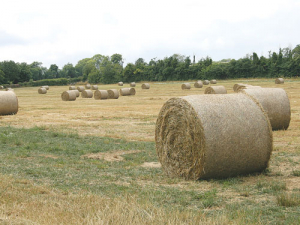Turning data into dollars
If growing more feed at home adds up to $428 profit per tonne of dry matter to your bottom line, wouldn’t it be good to have a ryegrass that gets you there quicker?
 In practice, silage is often not made at the optimal time, and little attention is paid to the silage-making process.
In practice, silage is often not made at the optimal time, and little attention is paid to the silage-making process.
Making high-quality pasture silage should not be difficult, but it must be viewed as a supplementary feed, rather than just a necessity to manage pasture.
NZ experimental results indicate that increasing silage quality by 2.3 MJ ME/kg DM increased MS production by 13, 17 and 41% in spring, summer and autumn, respectively. Higher quality feed will also increase BCS gain/kg DM eaten.
Making of silage should only be done from a true surplus and the objective is to preserve as many of the original nutrients as possible. In practice, however, silage is often not made at the optimal time, and little attention is paid to the silage-making process.
When grass is cut and left in a heap, it rots! Silage-making is the process of ‘pickling’ pasture to reduce the pH (acidity) to a level that stops the feed ‘rotting’ (i.e. stops microbial activity).
This is achieved through packing the pasture and covering it with plastic to exclude air, while microorganisms burn the sugars in the grass to produce lactic and acetic acid. If the silage is exposed to air (e.g. torn plastic) a chain reaction occurs that reduces silage quality.
Pasture silage can be made either in a field stack, a pit/concrete bunker (on top of the ground) or as bales. Provided the quality of the material going into the silage is the same and proper attention is paid to compacting and covering the pasture, pasture silage quality should be the same from either stack/pit or baled silage.
The decision to make bales or stack/pit silage is generally dependent on the farm system, the method of feeding silage and the infrastructure available for silage storage.
- Baled silage is more costly but enables flexibility of crop size and storage location onfarm and feeding out of small amounts on set occasions.
- Stack silage can also be stored in many locations and is cheaper than baled silage.
- Pit/bunker silage does not offer flexibility in storage but when properly used will result in less wastage. Pit silage is easier to compact and therefore to expel air.
Rural Women New Zealand (RWNZ) says it welcomes the release of a new report into pay equity.
Red meat exports to key quota markets enjoyed $1.4 billion in tariff savings in the 2024-25 financial year.
Remediation NZ (RNZ) has been fined more than $71,000 for discharging offensive odours described by neighbours as smelling like ‘faecal and pig effluent’ from its compositing site near Uruti in North Taranaki.
Two kiwifruit orchards in the Bay of Plenty and one in Northland are this year's finalists for the Ahuwhenua Trophy competition.
The Government's chief science advisor, Dr John Roche says the key objective for the science sector in the coming year is bedding down the reforms which sees the merger of the previous entities.
Hawke's Bay apple grower Taylor Corporation says a standout 2026 season, coming after a few difficult years, is boosting optimism among growers.
OPINION: Staying with politics, with less than nine months to go before the general elections, there’s confusion in the Labour…
OPINION: Winston Peters' tirade against the free trade deal stitched with India may not be all political posturing by the…